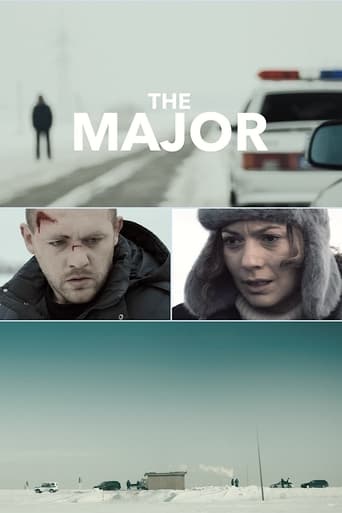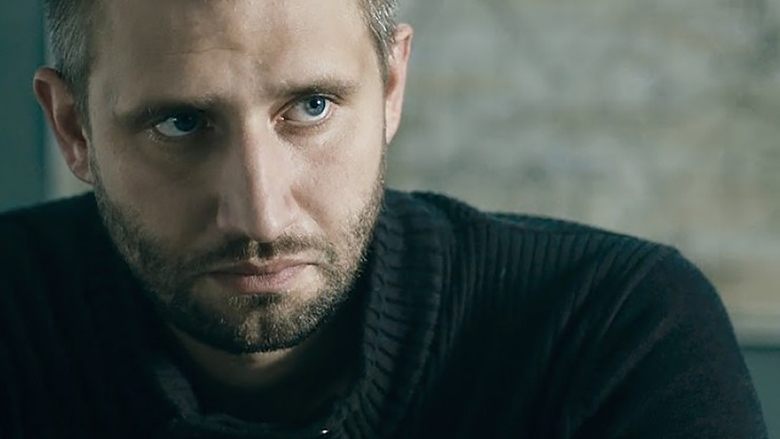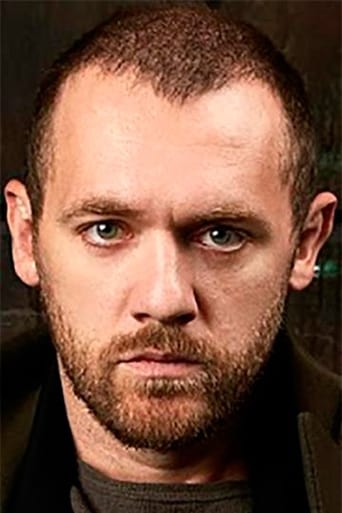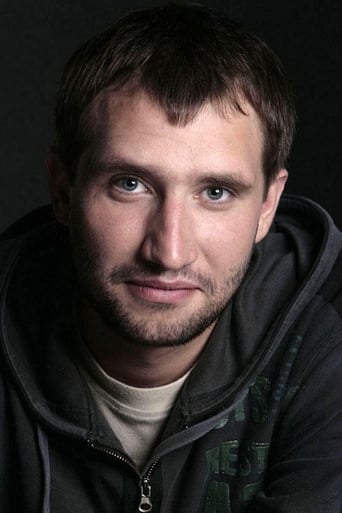

The Major (2013)
On a cold winter’s day Sergey Sobolev, a major at the local police office, is driving to the hospital where his wife is about to give birth to their child. High from happiness, he’s driving too fast and runs down a boy on a passage walk, who dies. Now the major has only two options: go to prison or conceal the crime. Sobolev decides to compromise with his conscience and calls on a colleague to help him out. But the case turns out to be messy and when Sobolev finally changes his mind and tries to make up for his deed, it’s already too late…
Watch Trailer
Cast
Reviews
Wonderful character development!
Fun premise, good actors, bad writing. This film seemed to have potential at the beginning but it quickly devolves into a trite action film. Ultimately it's very boring.
Although I seem to have had higher expectations than I thought, the movie is super entertaining.
The film's masterful storytelling did its job. The message was clear. No need to overdo.
This plot of this movie is rather depressing and has a sad ending, but like so many Russian films the acting and cinematography are great.The film centers on the issue of corruption in the Russian system and the influence the mafia has on law enforcement. The protagonist, a deputy police chief, by accident runs over a boy while rushing to witness his own child's birth. The mother of the child signs a statement taking the blame for the boy's death to save her husband from a beating by police. The conscience of the protagonist gets the better of him and he refuses to allow blame for the boy's death to shift to the mother. This angers the corrupt officials who fear the bad publicity will threaten their hold on power. Ultimately the protagonist's desire to take responsibility for his action leads to more spilled blood and turns a bad situation into a tragedy when he has to take the life of the boy's mother to save his own wife and child.No Hollywood fluff or pizazz here, just gritty and realistic characters caught up in a drama. One of the reasons I am a big fan of Russian cinema.
I was fortunate enough to see a DCP of this film tonight at a local theatre, and was duly impressed by emerging auteur Yuriy Bykov's second feature. Bykov, who wrote, directed, co- starred in, scored, and edited the film, has turned in a sophomore effort that duly justifies his rapid rise to esteem in modern Russian cinema. Ostensibly an action film, "The Major" is really a bleak and uncompromising morality play, focusing on moments in time when characters have to make choices - and the slippery slope towards an event horizon where choices are then made for the characters on the basis of their previous decisions, regardless of their current feelings. Major Sergey Sobolev (Denis Shvedov) in particular stands out as a modern-day Raskolnikov, who in one split second sets off a chain of events that seemingly becomes irreversible.The film opens with a moment of elation followed by a scene of unintended, but avoidable, violence which sets the tone for the rest of the picture. After receiving the news that his wife is in labor, Sergey speeds through a bleak, snowbound Russian landscape, carelessly passing other motorists. At a bus stop, a child begins walking away from his mother into the road. Moving too quickly to stop, Sergey honks his horn too late and swerves left - but the horn, and the mother's screaming, scare the boy, and he runs into the path of the car, being killed almost immediately. Sergey - seemingly in shock - looks around and appraises the situation. Then he begins to make choices. After a quick look, he makes no effort to save the boy; he locks the mother in the car, panicking, and takes her mobile phone when she tries to call out. He calls the station, and gets his friend Pasha (Bykov), at which point he is faced with another choice: does he take the consequences for his reckless driving, or with a wink and a nod, does he get the corrupt policemen he works with to cover for him? Of course, it is the latter choice, and with the arrival of Pasha and Merkulov (Ilya Isayev), an inevitable fate begins to set it - and the story begins to unfold.Far from being the standard sort of mindless action drivel being pumped out of Hollywood studios by the likes of Michael Bay, "The Major" intelligently - and non-judgmentally - asks viewers at what point grey morality becomes black morality; at what point the results of a bad decision become irreversible and inevitable; at what point would the viewer themselves make the same (possibly immoral) choice. Without spoiling anything, this last question is devilishly well handled towards the end of the film. The film also asks what part loyalty plays, as it becomes clear that we're dealing with a group of coppers who cover for each other on a regular basis, on issues both mundane and serious. But the escalation of the situation, as the choices go from "good to not so good" right down to "bad or downright abysmal", is what truly drives this film; the action is merely a storytelling device that exists to impart gravitas to the thematic underpinnings.The acting is superb throughout; Shvedov and Bykov in particular turn in wonderfully nuanced performances. Isayev is great as well, in an understated performance that conveys his lack of agency throughout. The dead child's parents (Irina Nizina and Dmitriy Kulichkov) are believable in their various stages of grief, rage, anguish, and finally acceptance. The rest of the cast is fine as well. The film is beautifully shot in such a way as to provide a constant, grinding sense of despair and grit - from the yellow-green tinged police station to the snow-swept landscapes. The cinematography might not rival Sven Nykvist's work, but it is well above competent. Bykov's score, while occasionally over the top, complements the moods well most of the time. The pacing is excellent, and the resolution of the film works very well.It is worthy of note that, while this film gives the viewer plenty to contemplate, it does not emulate the metaphor-laden idiom that is characteristic of Russian cinema since at least Tarkovsky. The themes are fairly clear, and while the narrative is structured around an overwhelming web of decisions and consequences, the interpretations tend to be fairly clear. It is clearly of a different era and a different language than, say, Alexei Gherman's "Hard To Be a God", another 2013 Eastern Bloc gem. Highly recommended; I'd give it a 9/10.
I saw this film at the Leiden film festival 2013 (LIFF). It is not the usual story about the incompetent police force in Russia. Neither is corruption the issue here, also a popular topic in Russian films. Nevertheless, the local police does not leave a positive impression after this, and we cannot know whether this applies only to the city at hand. Anyway, intended as social commentary or not, the people working in the police force show their human nature, precisely that being the cause of all the intricacies we witness in this movie. They mean well, but they weave a tangled web, so to speak.It starts simply with colleagues wanting to prevent a fellow police officer punished for something he is formally accountable for, namely fatally wounding a child while hastily driving to a maternity hospital after a phone call that his wife was about to give birth to a child. But, given his spotless past plus the obvious reasons for his speedy driving, those colleagues are prepared to bend the truth a little bit.It could have worked. However, higher echelons insist on a water tight cover up, that can never reach a court. That includes "coercing" the mother of the killed child to agree on a false statement. In spite of everyone's good intentions, with each step it gets more and more out-of-control. There is no easy way out of the mess, getting more problematic by the hour.All in all, in spite of the depressing view on the Russian police force we see in action, the self-inflicted complications make this into an interesting story. We witness the averse side effects of the well-intended cover-up, and the equally well-intended corrective actions making the situation worse and worse. I'd rather not deal with the police force and their superiors within city hall, such as the ones portrayed in this film. It is comforting that it is in a country far away, and we can safely watch the story explode in everyone's faces from our comfy chairs. The ability to see many other countries and different "political" rules of engagement, is a nice feature of a film festival. This film offered some good insights in that respect, and precisely that defines the positive things about this film. Most festival visitors seem to disagree, however, as this film ranked a lowly 37th place (out of 55) for the audience award.
Wonderful, amazing, superb, but maybe not for everyone...This Russian crime movie is an unexpected film indeed. An unusual scheme that reminds me a french movie made in 1975: LA TRAQUE. Not the same story,but the same atmosphere and especially the same lack of moral and ethics. A film that leaves you an ash taste in your mouth. See for yourself.In the deep Russia country side, a police officer accidentally kills a young boy whilst driving his car. And the child's mother is the only witness. Then, after the accident, the cop's colleagues arrive and decide to "arrange" the actual events, so that the Internal Affairs do not interfere with the local police force. See what I mean?And the police officers will stop at ANYTHING to get rid of the poor child's mother and father. So that the two of them do not jeopardize what the rotten cops have decided to cover up. Powerful performances, and also an outstanding character study.Enjoy the ending, where the child's mother runs away with her son's killer, who wants to save her from his fellow police officers.The Americans will NEVER make such a film, even the independent industry. NEVER.


